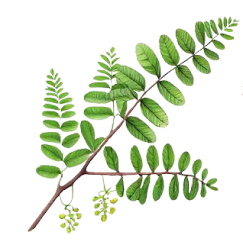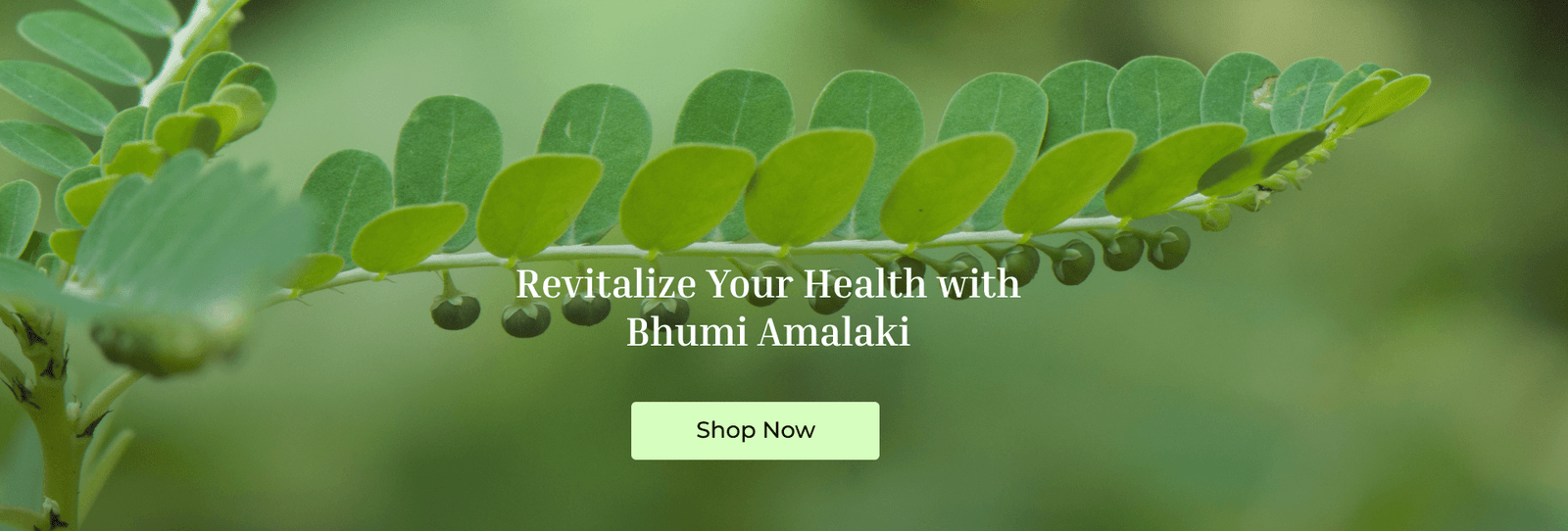Why Bhumi Amalaki?
Bhumi Amalaki (Phyllanthus niruri) is a powerful Ayurvedic herb, traditionally used for liver and kidney health. Originating from India, this small annual herb grows abundantly in warmer regions and is revered for its holistic healing properties.
Sanskrit Name: Bhumi amalaki
Common Names: comprise Jangli Amala, Bhuianvalah, Jaramla, Bhuiamla, and Bahupatra.
Letin Name: Phyllanthus niruri
Family: Phyllanthaceae
Botanical name: Phyllanthus niruri
English Name: Gale of the Wind/Stonebreaker
Habit: Annual shrub
Part used: whole plants

Liver Care
Supports the management of conditions such as jaundice and an enlarged liver.

Kidney Health
Assists in treating kidney stones and urinary tract infections.

Digestive Support
Effectively tackles chronic dysentery and ulcers.

Balances Doshas
Helps to calm Pitta and Kapha, promoting overall wellness.
Ayurvedic Properties

Rasa (Taste)
Tikta (Bitter), Kashaya (Astringent), Madhura (Sweet)
Guna (Properties)
Laghu (Light), Ruksha (Dry)
Virya (Potency)
Shita (Cold)
Vipaka (Post-digestive effect)
Madhura (Sweet)
Doshakarma
Kapha-Pittashamak (Balances Pitta & Kapha)

Medicinal Uses
Bhumi Amalaki is an incredible friend when it comes to tackling liver problems like hepatomegaly (that’s an enlarged liver) and jaundice. It really helps boost liver function, working to detoxify and get everything back on track. By cutting down on inflammation and swelling, it supports the liver’s ability to regenerate and process toxins more effectively. Plus, using it regularly can help ease symptoms of spleenomegaly, promoting overall organ health. And as a bonus, it even helps block the reproduction of the hepatitis B virus while acting as a liver stimulant.

Blocks hepatitis B virus reproduction and acts as a liver stimulant.
This herb is a fantastic solution for kidney stones, helping them dissolve and be eliminated naturally.Bhumi Amalaki is renowned for its antilithic and diuretic effects, which help cleanse the bladder. This suggests that it helps to keep things going smoothly down there! It further serves to reduce the amount of inflammation and swelling in the kidneys, bringing much-needed comfort to patients suffering from nephrotic syndrome. It promotes optimal kidney function, which helps drain out pollutants and maintain fluid an equilibrium in the body. Many individuals regard this particular plant as a go-to treatment for bladder stones and other urinary problems.

Treats kidney stones and alleviates urinary disorders.
Daibtes: is important for the therapy of genito-urinary diseases in diabetics because of its disinfectant & anti-inflammatory properties. It helps get rid of illness, restores the normal colour and flow of urine, and eases pain from conditions including urinary system inflammation. is also useful for treating pain or heat-related problems in your bladder because of the herb’s capacity to relax pitta. It is also a great partner in controlling blood sugar issues.

Regulates blood sugar levels effectively.
Digestive AId As an elimination aid, this species of plant helps reduce inflammation in the gut and chronic dysentery. Its carminative, astringent, and bitter qualities help to reduce swelling, calm the inner layer of the stomach, and keep off infections. Bhumi Amalaki is a well-rounded cure for digestive health since it maintains a healthy appetite, contributes to regular bowel motions, and treats gastrointestinal ulcers or sores. It functions wonderfully to alleviate dyspepsia.

Relieves dyspepsia, ulcers, and chronic dysentery.
Traditional & Modern Applications
Traditional Uses
It is widely utilised as a liver cleanser and in conventional treatments to treat diabetes, jaundice, and urinary tract problems.
Modern Research
Hepatitis & Liver Care – Protects the liver from damage and supports its health.
Kidney Wellness – Effectively treats kidney stones and urinary infections.
Blood Sugar Control – Assists in naturally lowering blood sugar levels.
Digestive Aid – Eases indigestion and promotes gut health.
Antiviral Protection – Inhibits the replication of the Hepatitis B virus



